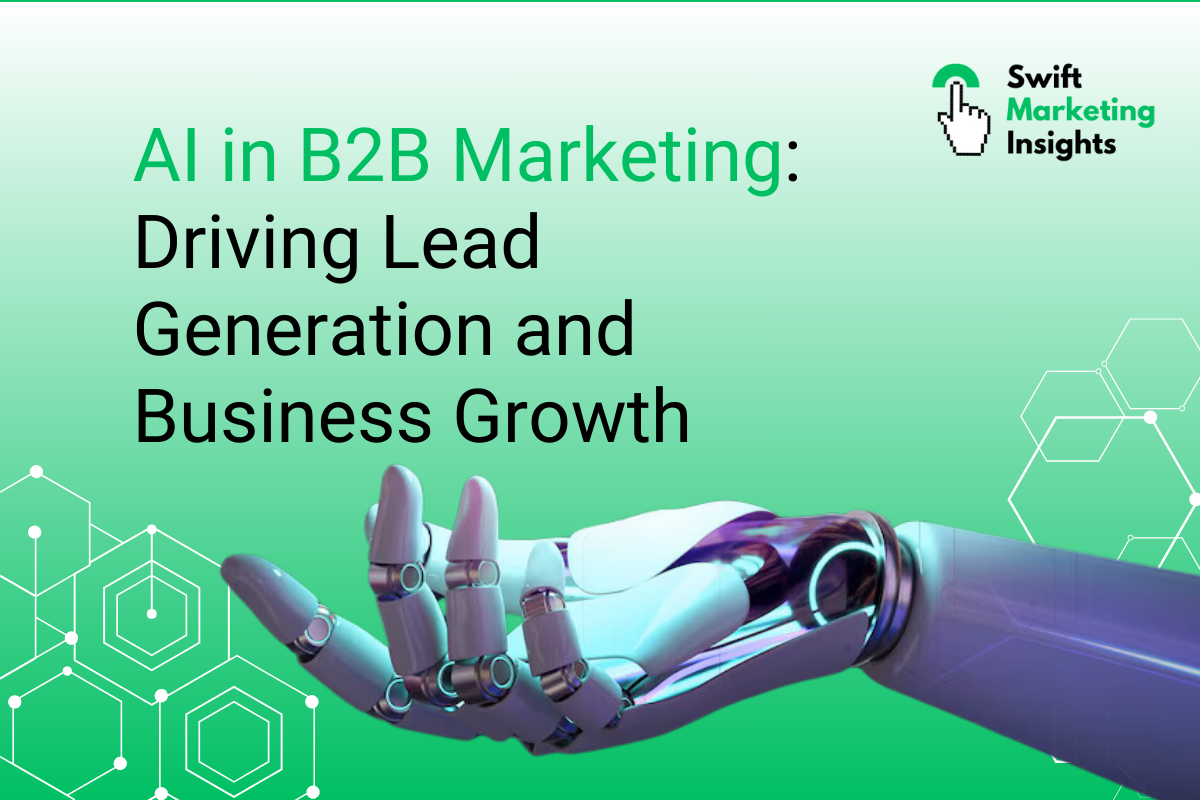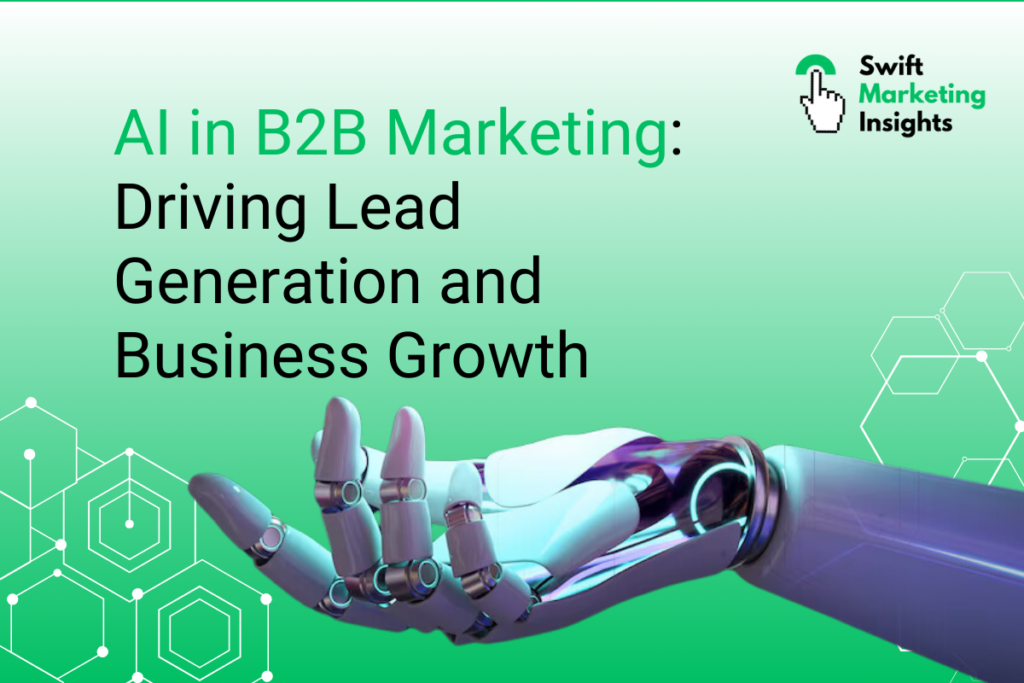

Can AI Transform Your B2B Lead Generation Strategy?
Are you struggling to generate high-quality B2B leads? Have you considered how AI-powered B2B lead generation can revolutionize your approach?
Leveraging AI for lead generation can significantly transform a company’s competitive business landscape. In this blog, we’ll understand how AI-driven B2B lead generation can optimize your lead-generation efforts, improve B2B lead nurturing, and enhance your overall marketing strategy. By the end of this blog, you’ll have actionable insights to unlock substantial B2B growth through the power of AI.
The Power of AI-Powered B2B Lead Generation
AI is no longer a futuristic concept but a practical tool transforming industries. For B2B companies, AI offers unprecedented opportunities to refine and optimize lead generation processes. AI-powered B2B lead generation harnesses advanced algorithms, machine learning, and predictive analytics to identify and engage potential leads with precision.
AI marketing for B2B lead generation leverages data from various sources, providing valuable data insights that can enhance your conversion optimization efforts. With AI, you can identify patterns, predict outcomes, and make data-driven decisions that drive higher ROI.
How AI-Driven B2B Lead Generation Works
Understanding the mechanics of AI-driven B2B lead generation is crucial for implementing it effectively. Here’s a breakdown of how it works:
- Data Collection: AI gathers data from various sources, including CRM systems, social media, and website interactions.
- Data Analysis: The collected data is analyzed using machine learning algorithms to identify patterns and trends.
- Lead Scoring: AI assigns scores to leads based on their conversion potential, enabling you to prioritize high-potential leads.
- Personalization: AI enables personalized marketing campaigns by understanding individual lead preferences and behaviors.
- Automation: AI is revolutionizing the business’s operation by automating repetitive tasks, allowing teams to concentrate on strategic activities.
By incorporating these elements, AI enhances your B2B lead nurturing efforts and drives better results.
Data-Driven B2B Lead Generation Strategies
To fully leverage data-driven B2B lead generation, it’s essential to adopt effective strategies and appropriate AI tools that maximize AI’s potential. Here are some key strategies:
- Predictive Analytics: Use AI to forecast lead behavior and customize your marketing efforts accordingly. Tools like HubSpot and Marketo offer advanced predictive analytics to forecast lead behavior.
- Content Personalization: Deliver personalized content to leads based on their interests and behaviors. Maintain a single source of truth for all your customer data to maintain data consistency.
- Segmentation: Segment your audience into targeted groups to deliver more relevant messages.
- Multi-Channel Engagement: Utilize AI to manage and optimize engagement across multiple channels. Streamline processes and enhance collaboration between marketing and sales teams.
- Lead Scoring Solutions: Platforms like Salesforce Einstein and InsideSales provide robust lead-scoring capabilities.
- Marketing Automation Software: Pardot and Eloqua are marketing solutions that automate tasks and integrate seamlessly with AI technologies.
- Real-Time Insights: Leverage real-time data to make informed decisions and adjust strategies promptly.
Benefits of AI-Driven B2B Lead Generation
AI Marketing for B2B Lead Generation
AI marketing for B2B lead generation involves using AI technologies to enhance various aspects of your marketing efforts. Here are some key benefits:
Enhanced Efficiency and Accuracy
By automating data analysis and lead scoring, AI significantly reduces the time and effort required to identify high-quality leads. This leads to:
- Increased Efficiency: Automate time-consuming tasks and improve overall marketing efficiency.
- Improved Accuracy: AI’s data-driven insights minimize human error and ensure that your lead-generation efforts are precise and effective.
Personalized Marketing
AI enables highly targeted and personalized marketing campaigns. By understanding the unique needs and preferences of your prospects, you can:
- Enhance Lead Nurturing: Deliver personalized content and offers to nurture leads through the sales funnel.
- Boost Engagement: Customize your messaging or use AI insights to resonate with specific audience segments to optimize your campaigns and increase conversion rates.
Scalability
AI-driven solutions can easily scale to handle large volumes of data and leads, making them ideal for businesses looking to grow rapidly. This scalability allows you to:
- Expand Your Reach: Identify and engage by focusing on high-potential leads and optimizing your marketing spend to achieve better ROI.
- Adapt Quickly: Accurately and precisely respond to market changes and opportunities.
Best Practices for Implementing AI in B2B Lead Generation
To successfully implement AI in your B2B lead generation strategy, follow these best practices:
Start with Clear Goals:
Establish clear goals for AI-powered lead generation to ensure your objectives are met effectively.
Focus on Quality Data
High-quality data is the foundation of effective AI-driven lead generation. Make sure you have access to high-quality data that AI can analyze. For high-quality data ensure that your data is:
- Accurate: Regularly clean and update your data to eliminate inaccuracies.
- Comprehensive: Collect data from various sources to gain a holistic view of your prospects.
Continuously Monitor and Optimize
AI systems require ongoing monitoring and optimization to deliver the best results. Regularly review your AI models and adjust them based on performance metrics to:
- Improve Accuracy: Refine your algorithms to enhance lead scoring and predictions.
- Adapt to Changes: Update your models to reflect changes in market conditions and customer behavior.
Align AI with Business Goals
Ensure that your AI-powered lead generation efforts are aligned with your broader business objectives. This alignment helps:
- Drive Results: Focus your AI initiatives on achieving specific goals, such as increasing lead conversion rates or improving customer retention.
- Measure Success: Use key performance indicators (KPIs) to track the impact of AI on your business outcomes.
Implementing AI in Your B2B Lead Generation Strategy
Choosing the Right AI Tools and Train Your Team:
Select AI tools that align with your business’s needs and goals and educate your team on the effective use of these tools.
- Predictive Analytics Platforms: Tools like HubSpot and Marketo offer advanced predictive analytics to forecast lead behavior.
- Lead Scoring Solutions: Platforms like Salesforce Einstein and InsideSales provide robust lead-scoring capabilities.
- Marketing Automation Software: Solutions such as Pardot and Eloqua automate marketing tasks and integrate seamlessly with AI technologies.
Integrating AI with Existing Systems
To maximize the benefits of AI, integrate it with your existing CRM and marketing platforms. This integration ensures:
- Data Consistency: Maintain a single source of truth for all your customer data.
- Seamless Workflows: Streamline processes and enhance collaboration between marketing and sales teams.
Take Your B2B Lead Generation to the Next Level with AI
Ready to revolutionize your B2B lead generation strategy with AI?
By implementing the strategies and best practices outlined in this blog, you can tackle the power of AI to drive significant business growth.
Talk to our B2B industry experts at SwiftMarketing today and explore how our AI-powered solutions can optimize your lead generation efforts, enhance B2B lead nurturing, and elevate your overall marketing strategy.






